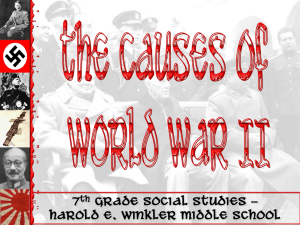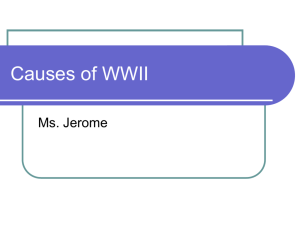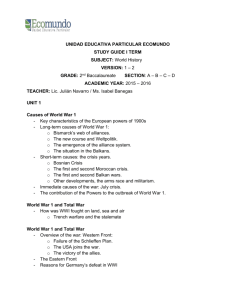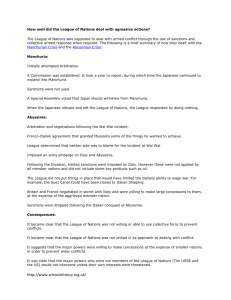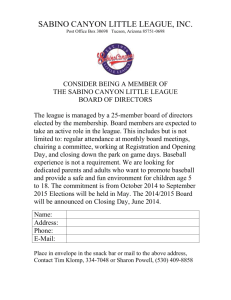History Appeasement FA 2 SBQ Mich Zhu
advertisement
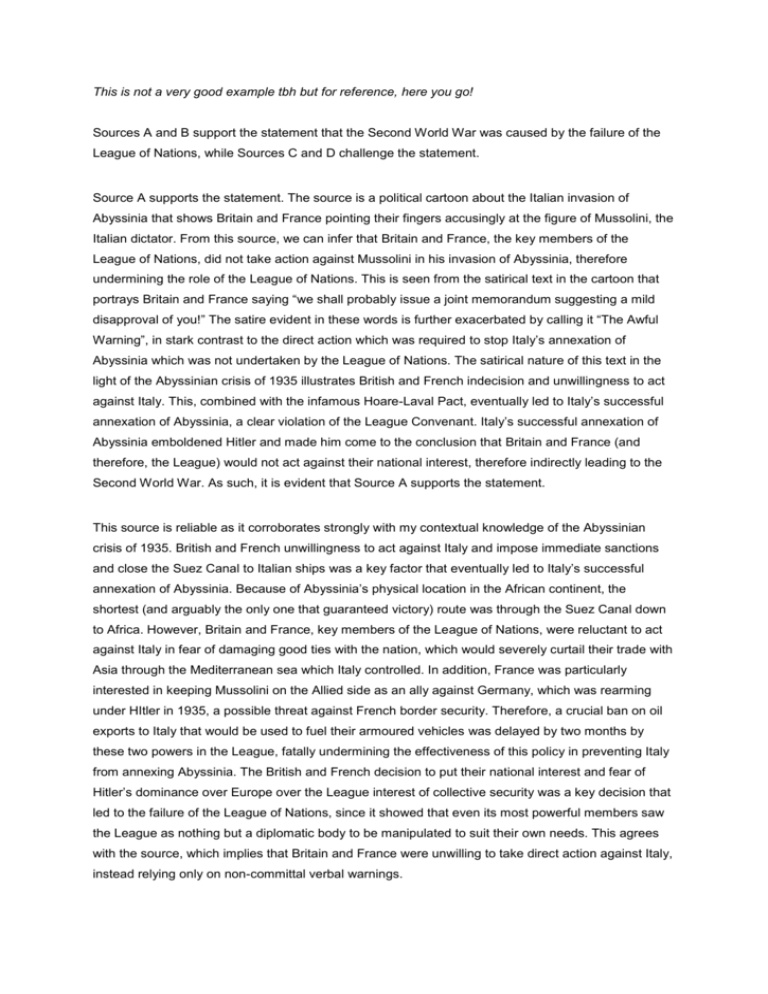
This is not a very good example tbh but for reference, here you go! Sources A and B support the statement that the Second World War was caused by the failure of the League of Nations, while Sources C and D challenge the statement. Source A supports the statement. The source is a political cartoon about the Italian invasion of Abyssinia that shows Britain and France pointing their fingers accusingly at the figure of Mussolini, the Italian dictator. From this source, we can infer that Britain and France, the key members of the League of Nations, did not take action against Mussolini in his invasion of Abyssinia, therefore undermining the role of the League of Nations. This is seen from the satirical text in the cartoon that portrays Britain and France saying “we shall probably issue a joint memorandum suggesting a mild disapproval of you!” The satire evident in these words is further exacerbated by calling it “The Awful Warning”, in stark contrast to the direct action which was required to stop Italy’s annexation of Abyssinia which was not undertaken by the League of Nations. The satirical nature of this text in the light of the Abyssinian crisis of 1935 illustrates British and French indecision and unwillingness to act against Italy. This, combined with the infamous Hoare-Laval Pact, eventually led to Italy’s successful annexation of Abyssinia, a clear violation of the League Convenant. Italy’s successful annexation of Abyssinia emboldened Hitler and made him come to the conclusion that Britain and France (and therefore, the League) would not act against their national interest, therefore indirectly leading to the Second World War. As such, it is evident that Source A supports the statement. This source is reliable as it corroborates strongly with my contextual knowledge of the Abyssinian crisis of 1935. British and French unwillingness to act against Italy and impose immediate sanctions and close the Suez Canal to Italian ships was a key factor that eventually led to Italy’s successful annexation of Abyssinia. Because of Abyssinia’s physical location in the African continent, the shortest (and arguably the only one that guaranteed victory) route was through the Suez Canal down to Africa. However, Britain and France, key members of the League of Nations, were reluctant to act against Italy in fear of damaging good ties with the nation, which would severely curtail their trade with Asia through the Mediterranean sea which Italy controlled. In addition, France was particularly interested in keeping Mussolini on the Allied side as an ally against Germany, which was rearming under HItler in 1935, a possible threat against French border security. Therefore, a crucial ban on oil exports to Italy that would be used to fuel their armoured vehicles was delayed by two months by these two powers in the League, fatally undermining the effectiveness of this policy in preventing Italy from annexing Abyssinia. The British and French decision to put their national interest and fear of Hitler’s dominance over Europe over the League interest of collective security was a key decision that led to the failure of the League of Nations, since it showed that even its most powerful members saw the League as nothing but a diplomatic body to be manipulated to suit their own needs. This agrees with the source, which implies that Britain and France were unwilling to take direct action against Italy, instead relying only on non-committal verbal warnings. Source B supports the statement. This source states that Britain and France did not support sanctions that would have effectively checked Mussolini and prevented him from successfully annexing Abyssinia because they feared that it would force Mussolini to go to war with them. From the source, we can infer that Britain and France placed their national interest above League interest in stopping Italy from annexing Abyssinia, therefore undermining the League’s authority and power. The removal of the League of Nations as a key authority to maintain collective security and halt aggression then emboldened Hitler, indirectly leading to the Second World War. Therefore, Source B supports the statement that the Second World War was caused by the failure of the League of Nations. Source B is reliable as it corroborates with Source A, which was previously proved reliable. Source A implies that Britain and France were unwilling to take action against Italy as it went against its national interest, and Source B likewise states that their national interest was prioritized against League interest, thus allowing Italy to violate the Convenant of the League without much interference. The message of Source B is an extension of Source A, and it directly shows that Britain and France refused to prioritize League interest above national interest, whereas the message is only hinted at in Source A by the biting satire of the cartoonist. Seen together, both sources point to the idea that the failure of the League of Nations was caused largely by Britain and France putting national interest above the League’s idea of collective security, therefore undermining its authority and power, emboldening Hitler and leading to the Second World War, thus proving Source B reliable. Source C challenges the statement. From Source C, we can infer that war was caused largely because of Hitler’s expansionist aims and his ultimate goal of achieving Lebensraum, or living space for Germany. This is evident in his speech to his military commanders at a meeting in May 1939, just four months before Germany invaded Poland, sparking the Second World War. Hitler states in his speech that “living space proportional to the greatness of the state is fundamental to every power”, illustrating his deep belief in Lebensraum for the German Empire of his dreams. This shows that invasion and therefore war was inevitable for Hitler to fulfil his plans of a great German Empire, which is emphasised by his saying “There is therefore no question of sparing Poland and we are left with the decision to attack Poland at the first suitable opportunity”. As such, Source C challenges the statement as it implies that war was a direct result of Hitler’s expansionist aims, rather than the failure of the League of Nations. Source C is reliable as it corroborates with my contextual knowledge. One of Hitler’s three main goals was to expand the German territory, to achieve Lebensraum and to unite German speaking people. This goal was clearly illustrated in Hitler’s foreign policy, with the best examples being Anschluss with Austria in 1935 as well as the Sudetenland Crisis in 1938. His expansionist goals, by 1939, were clear for everyone to see. Source C states that invading Poland was, to Hitler, a necessary matter, and this is also backed up by my contextual knowledge of Hitler wanted to invade Poland not only to obtain more living space, but also as a key stepping stone to eventually invading the Soviet Union and defeating Communism, another of his core goals. Since the invasion of Poland was a key step in attaining two of his three main goals, namely expanding his territory and defeating Communism, it is evident that war was a direct result of the necessary invasion of Poland by the Nazis. This source is further proved reliable by its provenance. The source is an excerpt from Adolf Hitler’s speech to his military commanders at a meeting months before the invasion of Poland, and is therefore a directly useful and reliable source in analysing whether the invasion of Poland was one that was bound to happen irregardless of the failure of the League of Nations. Because the source is a first hand account from Hitler, its inference that the invasion of Poland was one that was necessitated by Hitler’s goals is evident, proving it reliable. Source D challenges the statement. Source D states that the policy of appeasement merely delayed and not averted the war, a concern which was echoed even by the people of the time, and notably by Neville Chamberlain, the man who was so determined to appease Hitler. From this source, we can infer that war was inevitable from the moment the Munich Agreement was signed. This is seen from how Chamberlain was “agreeing to a huge increase in defence spending to increase Britain’s armament in preparation for the war” even while signing the Munich Agreement, which he announced was “Peace in our time”. Source D is reliable, since it is supported by contextual knowledge. World War II began in September 1939, merely a year after the Munich Agreement, which was purported to bring peace. With the benefit of historical hindsight, we can see that war was made inevitable by appeasement, since it was a series of decisions that gave in to and therefore emboldened Hitler, even though its original aim was to prevent war by giving Hitler what he wanted, notably British and French inaction with regards to the remilitarization of Rhineland in 1936 and Anschluss with Austria in March 1938. However, Source D is not directly useful in proving or disproving the idea that the Second World War was caused by the failure of the League of Nations, since it does not address the cause of war itself, but simply stating that war was inevitable. In conclusion, the sources support the statement that the Second World War was caused by the failure of the League of Nations to a small extent. Sources A and B state that the failure of the League of Nations was a cause of war as British and French refusal to put League interest above national interest severely undermined the authority and power of the League. However, the sources do not directly point to the failure of the League of Nations as a cause for war, illustrating the failure itself rather than how it led to war. The link between the failure of the League of Nations as the cause of war is an indirect one and tenuous at best, and alternative causes of war are also brought up. Source C states that war was caused largely by Hitler’s expansionist policies which necessitated a Nazi invasion of Poland, precipitating the Second World War while Source D points to the inevitability of the war after the Munich Agreement of 1938. Although Source D is not directly useful in disproving the statement that the failure of the League of Nations was what led to the Second World War, it nevertheless succeeds in bringing out an alternative viewpoint that led to the inevitability of war-- the failure of appeasement rather than that of the League of Nations. As such, the sources support the statement that the Second World War was caused by the failure of the League of Nations to a small extent.
